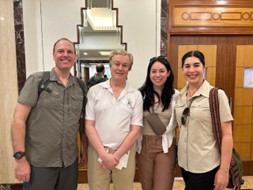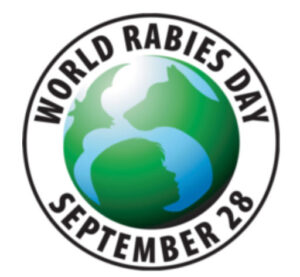Brought to you by PrideVMC Gold Partner, Merck Animal Health, in honor of World Rabies Day 2024
Author – Dr. Rob Armstrong
Rabies, a fiendish disease caused by an insidious viral enemy, kills almost all its victims. This pathogen can hide for months and possibly years in infected mammals and then climb, protected from the immune system, within nerves to reach and subsequently destroy the brain. The virus also invades saliva and spreads to new victims in the bite of a crazed sufferer. Dogs play a significant role in rabies human transmission because of their susceptibility; their biting behavior, and their close habitation with communities. Dogs most often infect children and the disease is devastating for families who also often face the additional challenges of poverty.

Merck Animal Health Colleagues in Mumbai, India
Fortunately, canine vaccines are safe and highly effective for rabies prevention with a relatively long duration of action following a single administration. The systemic immune response blocks rabies viruses at the bite site before they can enter nerves. Additionally, this virus does not survive well outside mammalian hosts, ensuring that vaccination is a wonderful tool to stop the spread of this disease. Through the twin pillars of vaccination and education, rabies can be eliminated.
Canine rabies vaccination programs are a simple humanitarian goal accepted and supported by multiple
communities and agencies in the complex world of today. It was a personal honor to be accepted as a volunteer to join the recent Mission Rabies campaign to vaccinate street dogs in Mumbai, India. Four colleagues from our companion animal teams also volunteered for this campaign, including Kristina, Scot, Chriche, and Warda. It was heartwarming to see a fridge full of Nobivac Rabies vaccines ready to join us every day in the streets of Mumbai.
Mumbai is a huge city with a population that seems to be always on the move. Streets are full of vehicles, bicycles, people, and animals. Many neighborhoods have substantial populations of street dogs, usually unvaccinated, that lie around in the daytime heat and are often fed by members of local communities. Vaccinating 25,000 of these dogs during the campaign week was the project goal. The work of the vaccination teams successfully beat this target.
 Vaccination campaign volunteers walked in small teams through all the neighborhoods of the city, dealing with the heat, dust, insects, and vehicles, to catch and vaccinate these street dogs. Support from the local community was incredible and small crowds gathered to find dogs and get them immunized. Community feeders were invaluable for the trust they earned from the dogs, because many of the dogs were shy about getting restrained by visitors. Experts with a catching net played an important role when physical restraint was unsuccessful.
Vaccination campaign volunteers walked in small teams through all the neighborhoods of the city, dealing with the heat, dust, insects, and vehicles, to catch and vaccinate these street dogs. Support from the local community was incredible and small crowds gathered to find dogs and get them immunized. Community feeders were invaluable for the trust they earned from the dogs, because many of the dogs were shy about getting restrained by visitors. Experts with a catching net played an important role when physical restraint was unsuccessful.
 This campaign is an intense, challenging, and beneficial project. Thank you to Mission Rabies for leadership, to Merck Animal Health for project co-sponsorship, to all colleagues who traveled to India to help, and to the local team for their dedication to an essential goal.
This campaign is an intense, challenging, and beneficial project. Thank you to Mission Rabies for leadership, to Merck Animal Health for project co-sponsorship, to all colleagues who traveled to India to help, and to the local team for their dedication to an essential goal.





